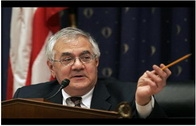Advertisement
Rep. Barney Frank to Retire in 2013

Rep. Barney Frank (D-MA), former Chairman of the House Financial Services Committee, has announced that he will not run again for a Congressional seat in the 2012 election. Rep. Frank was one of the co-authors of the Dodd–Frank Wall Street Reform and Consumer Protection Act, the sweeping piece of financial regulation that has left its mark on the mortgage industry and spawned the Consumer Financial Protection Bureau (CFPB). He will finish out his term and retire at the end of 2013.
"In 2010, after the Dodd-Frank Act was signed into law, I had tentatively decided to make this my last term," said Rep. Frank. "The end of next year will mark 40 years during which time I have held elected office and a period of 45 years since I first went to work in government full time as an aide to Mayor Kevin White in late 1967."
Frank began his political career in 1967 as executive assistant to Mayor Kevin White of Boston. In 1971, he served as the administrative assistant to Rep. Michael Harrington of Massachusetts. In 1972, he was elected to the Massachusetts House of Representatives where he held that seat for eight years. In 1980, he ran successfully to succeed Father Robert Drinan as Representative of the Fourth Congressional District of Massachusetts, a seat he has held, throughout the various redistricting of that district, for more than 30 years. In 2007, Frank became Chairman of the House Financial Services Committee. He currently serves as Ranking Member (the senior Democrat) of the Committee.
"I decided that my commitment to the public policies for which I have fought for 45 years required me to run for one more term," said Rep. Frank. "I was—and am—concerned about right-wing assaults on the financial reform bill, especially since we are now in a very critical period when the bill is in the process of implementation. In addition, recognizing that there is a need for us to do long-term deficit reduction, I was—and am—determined to do everything possible to make sure that substantial reduction in our excessive overseas military commitments forms a significant part of the savings over the next 10 years."
About the author





